May 22, 2025 | 16:43 GMT +7
May 22, 2025 | 16:43 GMT +7
Hotline: 0913.378.918
May 22, 2025 | 16:43 GMT +7
Hotline: 0913.378.918
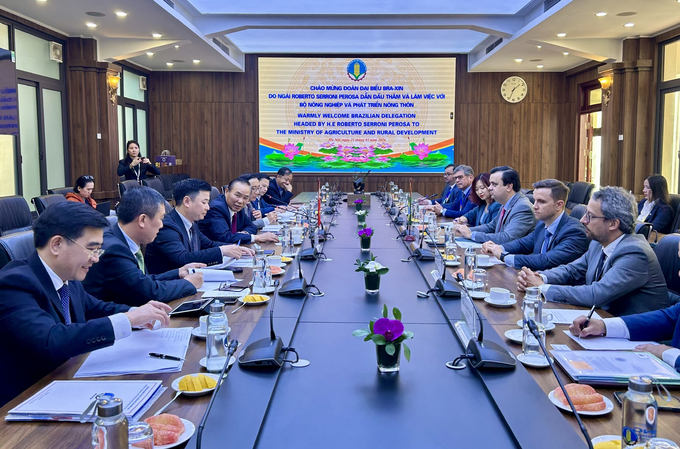
Deputy Minister of MARD Phung Duc Tien meeting and working with the Brazilian delegation led by Deputy Minister of Agriculture and Livestock Roberto Serroni Perosa. Photo: Linh Linh.
Deputy Minister of MARD Phung Duc Tien collaborated with the Brazilian delegation headed by Deputy Minister of Agriculture and Livestock Roberto Serroni Perosa on March 21.
Earlier that day, in Hanoi, Deputy Minister Phung Duc Tien and his Brazilian counterpart co-chaired the Workshop on Vietnam-Brazi Business Connection, which aimed to foster private sector engagement and agricultural sector cooperation between the two nations.
Mr. Roberto Serroni Perosa stated during the meeting that this year is a momentous one for Brazil and Vietnam, as the two nations are gearing up to celebrate thirty years of diplomatic relations with a broad schedule of events already taking place or in being planned.
In anticipation of a response from the MARD, Brazil raised three concerns, including the potential for exporting frozen chicken feet and the matter of revising the international inspection certificate; the feasibility of supplying Vietnam with fresh beef and by-products for animal feed; and the zoning of high pathogenic avian influenza in Vietnam for Brazilian products.
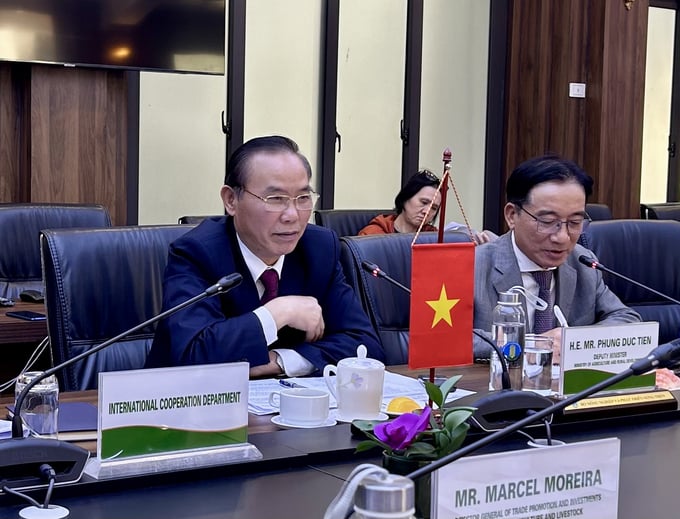
Deputy Minister of MARD Phung Duc Tien (left) acknowledged the proposals from Brazil during the meeting. Photo: Linh Linh.
In response to your suggestions concerning veterinary matters, the Department of Animal Health's Head of Animal Quarantine, Mr. Chu Nguyen Thach, provided an update on the situation. Brazil is a significant exporter of animals and animal products to Vietnam, with an annual increase in the number of Brazilian corporations involved, which exceeds one hundred. Brazil exported 197,000 tons of animals and animal products to Vietnam in 2023; yet, Vietnam exported only 35 tons of the opposite quantity.
Concerning inquiries about the exportation of beef, the Department of Animal Health disclosed that it had received a correspondence from Brazil at the beginning of March 2024 and intends to review it and provide a written response promptly. The Department was also issued a letter at the end of 2023 concerning frozen chicken feet and poultry by-products in general; however, this is a high-risk group that necessitates additional time for consideration.
In relation to avian influenza zoning and international inspection certificates, the Department of Animal Health has issued a request to the relevant Brazilian authorities for additional information and consent to the establishment of disease-free zones in accordance with the guidelines set forth by the World Organisation for Animal Health (OIE).
In relation to issues concerning plant protection, an official from the Plant Protection Department disclosed that Vietnam's principal exports to Brazil are rubber, cashew nuts, and spices; conversely, the country imports maize, wheat, and soybeans. Concerns regarding plant quarantine are routinely deliberated in the context of Brazil.
In reference to obstacles in the seafood industry, Mr. Le Ba Anh, Deputy Director of the Department of Quality, Processing, and Market Development, pointed out that Brazil is applying additive standards and conducting checks on additive indicators on Vietnamese pangasius catfish. These additive indicators fail to meet market demands and international standards. At this time, Brazil should reassess this matter.
In addition, Brazil yet to import Vietnam's whole frozen shrimp and imposes thermal treatment requirements that differ from OIE regulations on shrimp exported to Brazil. By way of the Brazilian Embassy, Vietnam has furnished the Ministry of Agriculture and Livestock with OIE documents, wherein it is contended that the aforementioned regulations necessitate modification in order to conform to global benchmarks.
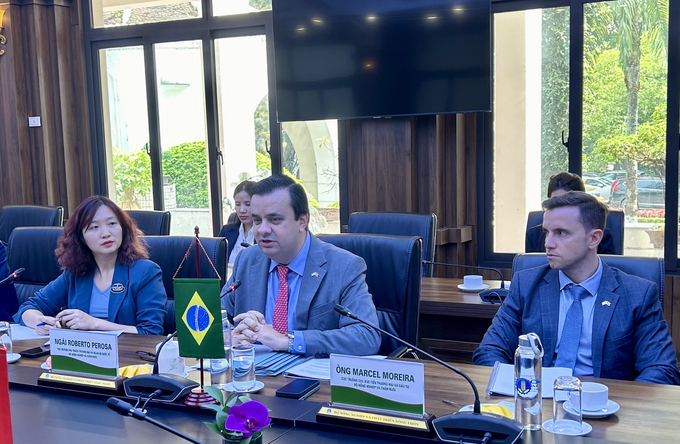
Deputy Minister of Agriculture and Livestock Roberto Serroni Perosa (center) affirmed that the list of agricultural export companies to Brazil will be approved soon. Photo: Linh Linh.
Furthermore, in order to accommodate the requirements of businesses, Mr. Le Ba Anh recommended that Brazil modify administrative procedures relating to the registration of product labeling and acknowledge additional expedited processing for the list of Vietnamese companies exporting agricultural products to Brazil.
Brazil opted to halt the importation of Vietnamese tilapia on February 14, pending the completion of a risk assessment about the TiLV virus. As proposed by the Department of Quality, Processing, and Market Development, cargoes that were already en route to Brazil prior to the decision should continue to be permitted for regular importation.
In response, Deputy Minister of Agriculture and Livestock Roberto Serroni Perosa stated that Brazil intends to review the list of exporting companies and that a letter will be dispatched by the Brazilian Embassy in Vietnam describing this determination.
Additionally, Mr. Perosa confirmed that shipments of tilapia from Vietnam to Brazil would be cleared routinely prior to the decision.
According to Deputy Minister Phung Duc Tien, Brazil has a wide-open access to the Vietnamese market. The agricultural products of the two nations are complementary as opposed to competitive. To assure competitiveness, Vietnam is willing to collaborate with Brazil on livestock feed and live cattle, subject to quality and price demands.
In accordance with OIE regulations, the Deputy Minister also recommended that Brazil expedite its decision regarding the import of frozen crustaceans that are devoid of heads and shells, thereby permitting the use of additives in pangasius catfish .
It was decided during the meeting that the Department of Quality, Processing, and Market Development would consult with the Embassy on matters of pangasius catfish and shrimp, whereas the Department of Animal Health would be responsible for concerns concerning the import of live cattle, beef products, and frozen chicken feet. The two parties intend to reach a written agreement as quickly as possible.
Translated by Dieu Linh
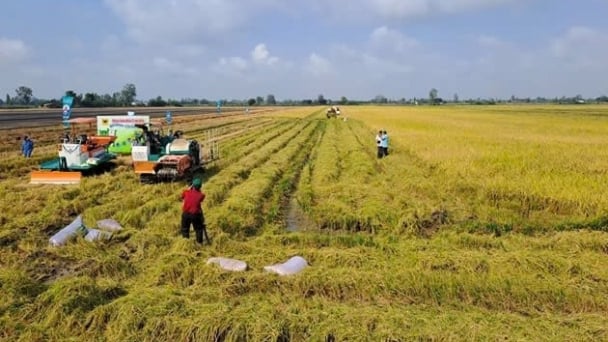
(VAN) To operate carbon market, one of the key issues is determining which types of 'commodities' meet the standards to be traded on the market.
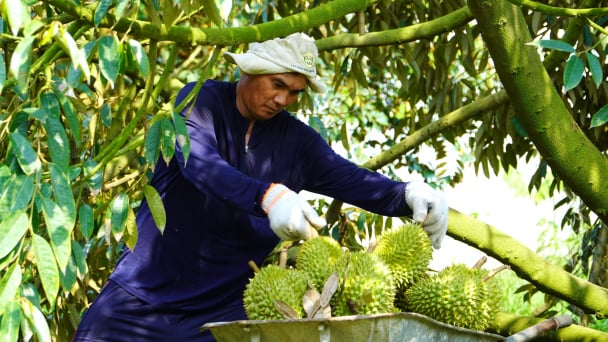
(VAN) Durian-producing localities need to coordinate more effectively with central authorities to improve the traceability, monitoring, and response systems in case of violations.
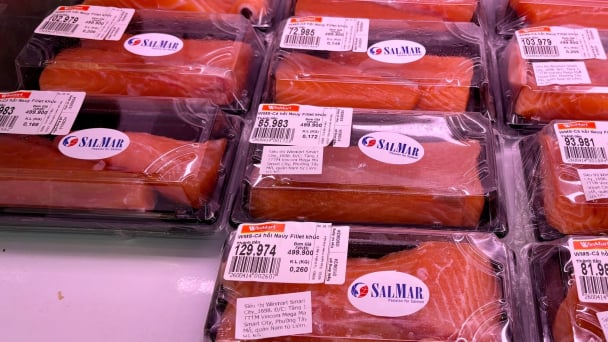
By minimizing waste, embracing modern technology, and expanding into niche markets, SalMar - the second largest producer of Atlantic salmon in the world has built a successful strategy to conquer the global market.
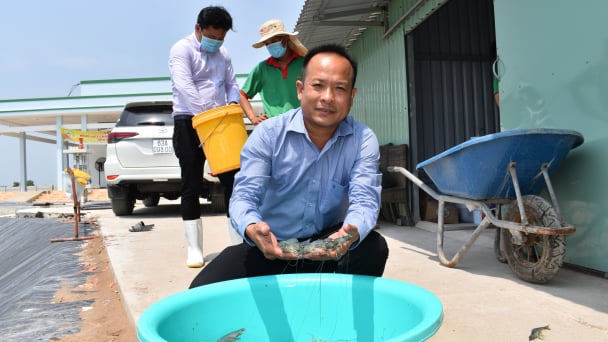
(VAN) One of the key factors for businesses to effectively take advantage of tariff preferences under these FTAs is the rules of origin.
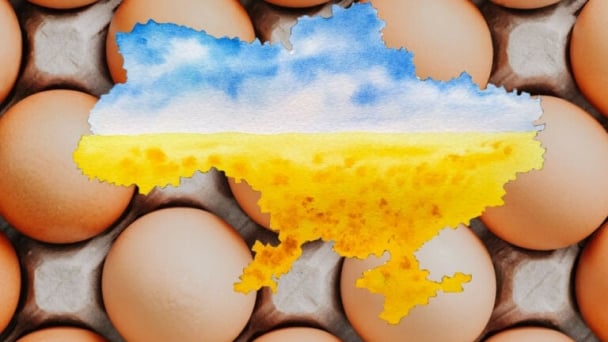
(VAN) Oliyar, a prominent Ukrainian oil and fat manufacturer, has revealed plans to build a farm for 2.3 million laying hens in the Lviv region. The additional production quantities promise to change the competitive landscape of the egg market of the Eastern Europe region.

(VAN) On May 15, Ministry of Agriculture and Environment of Vietnam hosted the 'Connecting Vietnam - Germany agricultural, forestry and fishery trade' seminar in Berlin, Germany.

(VAN) In the face of counterfeit and imitation products, Khanh Hoa Salanganes Nest Company hopes for the prompt completion of the legal framework, strict enforcement against violations, and protection of the bird’s nest brand.